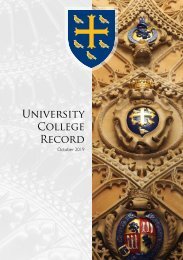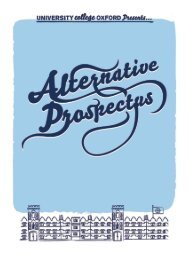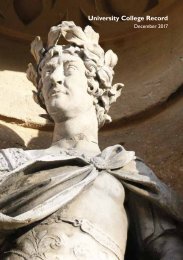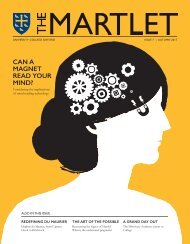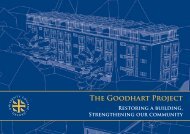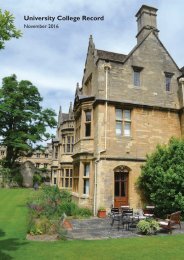Univ Record 2018
University College Oxford Record 2018
University College Oxford Record 2018
You also want an ePaper? Increase the reach of your titles
YUMPU automatically turns print PDFs into web optimized ePapers that Google loves.
his final challenges was swift action to restore the egg market, which had collapsed<br />
following alarmist comments by the then junior Health Minister, and thus to stop the<br />
needless panic slaughter of hens.<br />
As one of his former colleagues commented “To me Gordon was one of those people<br />
who exemplify the best of the British Civil Service in its best days.”<br />
After retirement, Gordon worked for 18 years with the Caribbean Banana Exporters’<br />
Association in their campaign to maintain preferential access to the EU. This involved<br />
securing for a large number of poor Caribbean banana growers – at least temporarily – a<br />
viable market for their crop in Europe. A copy of his book in support of this campaign,<br />
Banana Wars: the Price of Free Trade (2004), is in the College library.<br />
Gordon was a strong supporter of the College, which had given him not just a decisive<br />
step up in life, but also a circle of lifelong friends, including Frank Girling, John Verrier<br />
Jones, Tony Davidson, Peter Tucker, David Tanner and Eric Stanley.<br />
ERIC GERALD STANLEY (Queen Elizabeth’s GS,<br />
Blackburn) died on 21 June <strong>2018</strong> aged 94. He read<br />
English at <strong>Univ</strong>. Dr Philip Durkin, Deputy Chief<br />
Editor of the Oxford English Dictionary, has kindly<br />
allowed us to reproduce this shortened version of a<br />
tribute he wrote for the OED’s website:<br />
His many friends at the OED were saddened to hear<br />
of the death of Professor Eric Stanley, Rawlinson and<br />
Bosworth Professor of Anglo-Saxon at the <strong>Univ</strong>ersity<br />
of Oxford from 1977-91.<br />
Although he was never himself part of OED’s staff,<br />
the dictionary was part of Eric’s academic life since his<br />
undergraduate days. He learnt his craft from lectures by<br />
such luminaries as J. R. R. Tolkien, and he would often retell anecdotes about the OED’s<br />
earliest editors that he had heard from his tutors and advisers. Already by 1957 Eric was<br />
involved in collecting materials for the four-volume Supplement to the OED, and he was<br />
among those invited to comment on the first specimen proofs for the Supplement. He<br />
and Robert Burchfield, editor of the Supplement, were the same age, and became close<br />
friends.<br />
John Simpson, later OED’s chief editor, recalls Eric’s comments on Supplement<br />
proofs in the late 1970s: “Each consultant had an individual style and would focus in<br />
on particular problems. Some were minutely painstaking and others more broadbrush.<br />
Eric tended towards the broadbrush, peppering his galleys with occasional explosions of<br />
alarm when he had identified an error which needed correcting. … The comments bore<br />
witness to the breadth of his interests – as these proofs principally covered 19th and 20th<br />
century usage.”<br />
When work began in earnest on the complete revision of the OED in the mid-1990s,<br />
we finally began to be able to send Eric material with much more than a scrap of Old<br />
English for his expert comment. Although he had already retired, Eric gave OED3’s<br />
fledgling team invaluable advice on shaping policy for citing and interpreting Old English<br />
for the OED. He then embarked on what amounted to almost a further quarter century<br />
of close comment on dictionary proofs, now embracing all OED entries that contained<br />
any material that dated back to Old English or early Middle English. He took his brief<br />
74





